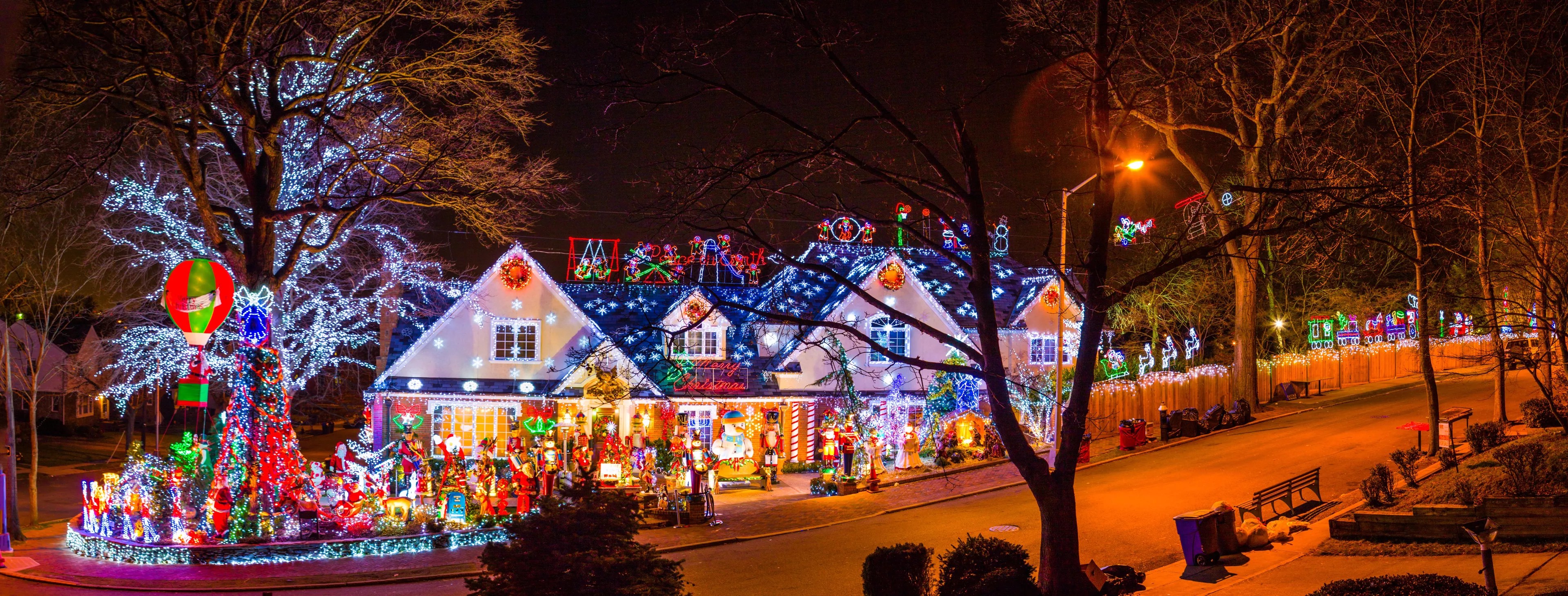
Adobe Stock

Audio By Carbonatix
Last December, a social media storm surrounding a dazzling Christmas display in a Preston Hollow neighborhood was swift and unrelenting. When that storm transitioned into a real-world whirlwind, neighbors, Dallas police and city code enforcement officers were left with little recourse.
There was hardly an inch of the 9,000 square-foot home that wasn’t covered in twinkling white lights, and social media exploded in adoration for the display. One TikTok posted by local influencer Chris James Kahle received 43,000 likes and was shared nearly 20,000 times. Instagram reels showing off the display garnered hundreds of thousands of views.
North Texans flocked to see the home for themselves, leading to a holiday season full of congested car and foot traffic, litter, noise and light nuisance. After receiving reports of property damage and individuals running across lanes of traffic to see the home, council member Gay Donnell Willis asked the Dallas Police Department to step in. Once the holiday season passed, Willis announced that the police resources needed to squash the hubbub cost taxpayers $25,000.
Monday, the Dallas City Council’s Quality of Life, Arts and Culture committee discussed adding “some teeth” to a city ordinance that would prohibit the “extraordinary neighborhood event” from happening ever again.
“At the core of this, though we’re calling these extraordinary neighborhood events, it’s really about extraordinary neighborhood disruption,” Willis, whose district includes the Deloache Avenue mansion that caused a Christmas season stir, said. “What I was working with definitely looked very commercial in nature. It was extraordinary. It was really cool, but not in the middle of a neighborhood street.”
@chris.james.kahle This Dallas home was out of control with the Holiday & Christmas lights! ðŸ“6215 Deloache Ave, Dallas Holiday lights! ✨✨ Check it out #dallaschristmas #christmaslights #holidaylights #dallastx #dallas ♬ Rockin' Around The Christmas Tree – Brenda Lee
According to a briefing from city officials, Dallas’ city code addresses permitting for outdoor events on public and private property. Gatherings requiring permits include home tours, small neighborhood parades and running events such as the Dallas marathon. What the code doesn’t address is spontaneous crowds like last December’s. According to reporting by The Dallas Morning News, the Deloache Avenue home received a citation for noise and light glare violations at one point, but a follow-up inspection found the issues had been fixed.
After that, the city’s hands were tied.
In Monday’s briefing, city staff suggested updating the Dallas city code to consider excessive light a nuisance. This change would give the city the ability to flip the switch in the event of a display leading to “sustained gatherings, traffic congestion, or blocked emergency access.”
Not every council person seemed to think that cracking down on light displays is the path forward. Council member Jaynie Schultz urged city staff to consider the tradition of families driving around Dallas to look at lights during the holiday season. She asked city officials to consider volume when defining what an extraordinary neighborhood event is, stating that even 100 cars driving past a home at night may be enough to bring a display into disruptive territory.
Council member Paul Ridley agreed with the sentiment. After city staff told the council that a code enforcement officer’s discretion is a “big piece” in determining what constitutes a neighborhood nuisance, Ridley encouraged the city to propose “some objective criteria” to the suggested light nuisance amendment.
“I’m concerned that we end up becoming Grinches, stamping out anyone’s holiday displays in an excess of zeal here,” Ridley said.
Staff also encouraged the council to consider introducing a land use amendment for event venues that would “provide a clear definition and threshold” to enforcers cracking down on gatherings or large parties taking place in residential neighborhoods.
The council voiced concerns about nuisance enforcement, something that Chris Christian, director of Code Compliance Services, said the department is not able to handle on its own. In the event of large gatherings or parties where a criminal citation could be issued to the homeowner, code enforcement officers cannot detain a person or force them to identify themselves, Christian said. Further complicating the discussion is that many of the types of gatherings or parties the council hopes to address through a code change take place at night.
Noise or disruption complaints that take place after hours are typically “a Dallas Police Department concern,” Christian said. Dallas Police Department data shows that noise complaint calls are averaging a four-and-a-half-hour response time across the city.
“If we move in a direction of modifying the code to give code [enforcement] a safer and more efficient way to enforce noise after hours in residential neighborhoods, then we’d have to have a whole other conversation about staffing and resources to do so,” Christian said.
Christian told the council he’d be open to discussing a partnership with the Dallas Police Department to help crack down on nighttime enforcement effectively. The committee will pick up the issue again in June.
“We’re the ninth largest city in America, and I feel like we’re a 24/7 operation. A lot of the issues we have, and I know that you all have worked to staff greater hours, overnight, etc., but I really think we need to go into this year’s budget looking at our city as a 24-hour city,” Willis said. “I just do not want to give up on this. Because this happened to me, but this can happen in any district.”